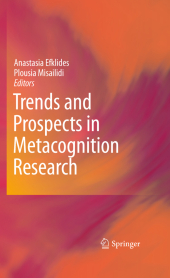 Neuerscheinungen 2014Stand: 2020-02-01 |
Schnellsuche
ISBN/Stichwort/Autor
|
Herderstraße 10
10625 Berlin
Tel.: 030 315 714 16
Fax 030 315 714 14
info@buchspektrum.de |

Anastasia Efklides, Plousia Misailidi
(Beteiligte)
Trends and Prospects in Metacognition Research
Herausgegeben von Efklides, Anastasia; Misailidi, Plousia
2010. 2014. xii, 479 S. 235 mm
Verlag/Jahr: SPRINGER, BERLIN; SPRINGER US; SPRINGER 2014
ISBN: 1-489-99328-2 (1489993282)
Neue ISBN: 978-1-489-99328-1 (9781489993281)
Preis und Lieferzeit: Bitte klicken
This book extends classical metacognitive research definitions, offering a foundation for the integration of research paradigms and concepts and building on the relationship between metacognition and consciousness, while integrating basic and applied research.
Trends and Prospects in Metacognition presents a collection of chapters dealing principally with independent areas of empirical Metacogition research. These research foci, such as animal metacognition, neuropsychology of metacognition, implicit learning, metacognitive experiences, metamemory, young childrenīs Metacogition, theory of mind, metacognitive knowledge, decision making, and interventions for the enhancement of metacognition, have all emerged as trends in the field of metacognition. Yet, the resulting research has not converged, precluding an integration of concepts and findings.
Presenting a new theoretical framework, Trends and Prospects in Metacognition extends the classical definitions offered by Flavell and Nelson to carry the prospect of more integrated work into the future. By opening the possibility to cross the boundaries posed by traditionally independent research areas, this volume provides a foundation for the integration of research paradigms and concepts and builds on the relationship between metacognition and consciousness, while integrating basic with applied research.
Developmental and Educational Implications of Metacognition.- Introduction: The Present and the Future in Metacognition.- Basic Research in Metacognition.- Metacognition in Nonhumans: Methodological and Theoretical Issues in Uncertainty Monitoring.- The Metacognitive Role of Familiarity in Artificial Grammar Learning: Transitions from Unconscious to Conscious Knowledge.- Fringe Consciousness: A Useful Framework for Clarifying the Nature of Experience-Based Metacognitive Feelings.- Further Insight into Cognitive and Metacognitive Processes of the Tip-of-the-Tongue State with an Amnesic Drug as Cognitive Tool.- Prospective Memory Failure and the Metacognitive Experienceof "Blank in the Mind".- Metamemory in Schizophrenia: Monitoring or Control Deficit?.- The Realism in Childrenīs Metacognitive Judgments of Their Episodic Memory Performance.- Cognitive Interruption as an Object of Metacognitive Monitoring: Feeling of Difficulty and Surprise.- Tracking On-Line Metacognition: Monitoring and Regulating Comprehension in Reading.- Developmental and Educational Implications of Metacognition.- Metacognition in Young Children: Current Methodological and Theoretical Developments.- Metacognitive Development in Early Childhood: New Questions about Old Assumptions.- Childrenīs Metacognition and Theory of Mind: Bridging the Gap.- Self-Confidence and Academic Achievements in Primary-School Children: Their Relationships and Links to Parental Bonds, Intelligence, Age, and Gender.- Metacognition and Reading Comprehension: Age and Gender Differences.- Metacognition-Based Reading Intervention Programs Among Fourth-Grade Hungarian Students.- Metacognition and Spelling Performance in College Students.- Computer Use in a Primary School: A Case-Study of Self-Regulated Learning.- University Teachers Engaged in Critical Self-Regulation: How May They Influence Their Students?.- Metacognitive Knowledge of Decision-Making: An Explorative Study.


